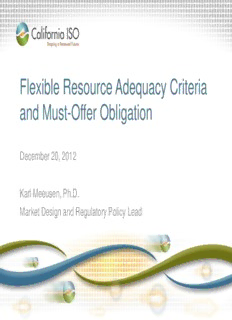
Flexible Resource Adequacy Criteria Must Offer Obligation Straw Proposal Dec 20, 2012 PDF
Preview Flexible Resource Adequacy Criteria Must Offer Obligation Straw Proposal Dec 20, 2012
Flexible Resource Adequacy Criteria and Must-Offer Obligation December 20, 2012 Karl Meeusen, Ph.D. Market Design and Regulatory Policy Lead Introduction and Stakeholder Process Tom Cuccia Page 2 Purpose of this initiative is to ensure the ISO has sufficient tariff authority to manage Flexible Capacity RA Resources • ISO will conduct a two stage process • The first stage, for 2014 RA compliance, focuses on: – Default provisions for LRA’s without flexible capacity procurement obligations – Backstop procurement authority • The second stage, for 2015 RA compliance, will focus on: – Enhanced performance obligations for flexible capacity resources, including must-offer obligations – Backstop procurement compensation for flexible capacity resource obligations, and – Revisions to the ISO Standard Capacity Product tariff provisions to apply to flexible RA capacity resources. Page 3 ISO Stakeholder Initiative Process We Are Here Page 4 Stakeholder Meeting – Agenda - 12/20/12 Time Topic Presenter 10:00 – 10:15 Introduction & Meeting Objective Tom Cuccia 10:15 – 10:45 Overview of Need and of the Joint Parties’ Karl Meeusen Proposal 10:45 – 12:30 Methodology for Determining Flexible Capacity Clyde Loutan and Procurement Requirements SCE 12:30 – 1:30 Lunch 1:30 – 2:30 Flexible Capacity Procurement Requirements Karl Meeusen and Backstop Procurement Authority 2:30 – 3:15 Procurement and Counting for Flexible Capacity Karl Meeusen Resources 3:15 – 3:30 Alternative Hydro Proposal Glenn Goldbeck (PG&E) 3:30 – 3:50 Issues to Resolve in Stage Two Karl Meeusen 3:50 – 4:00 Next Steps Tom Cuccia Page 5 Overview of Need and of the Joint Parties’ Proposal Karl Meeusen, Ph.D. Market Design and Regulatory Policy Lead Conventional resources will be dispatched to the net load demand curve CAISO Load, Wind & Solar Profiles – High Load Case January 2020 46,000 10,000 6,300 MW 13,500 MW 44,000 8,000 MW in 2 hours in 2 hours 9,000 42,000 in 2 hours 8,000 40,000 ) W 38,000 7,000 M ( ) d 36,000 6,000 W a M o L 34,000 ( r te 5,000 a N lo 32,000 S & & d 4,000 a 30,000 d o n L iW 28,000 3,000 26,000 2,000 24,000 1,000 22,000 20,000 0 0:00 1:30 3:00 4:30 6:00 7:30 9:00 10:30 12:00 13:30 15:00 16:30 18:00 19:30 21:00 22:30 0:00 Load Net Load Wind Solar Slide 7 Assessing future ramping needs: An example 46,000 Required Flexibility Ramp Rate 44,000 42,000 40,000 )W 38,000 Uncertainty Range M ( d 36,000 a o L 34,000 t e N & 32,000 d Ramp = a o 30,000 L 17,000 MW 28,000 in 3 hrs 26,000 24,000 22,000 20,000 1 2 3 4 5 6 7 8 9 10 11 12 13 14 15 16 17 18 19 20 21 22 23 24 Net Load Slide 8 8 Net load pattern changes significantly starting in 2015 CAISO Net Load --- 2012 through 2020 27,000 25,000 Typical March Day – significant 23,000 change starting in 2015 2012 2013 21,000 2014 W 2015 19,000 M 2016 2017 17,000 2018 2019 15,000 2020 13,000 Potential Over-generation 11,000 0 1 2 3 4 5 6 7 8 9 10 11 12 13 14 15 16 17 18 19 20 21 22 23 Slide 9 Objective of the Joint Parties’ Interim Flexible Capacity Proposal • The result of extensive negotiations with IOUs. • Craft an interim flexible capacity proposal that could: – Be implemented by the 2014 RA compliance year – Minimize added complexity and modifications to the current RA program and – Start the process of adding flexibility to the forward procurement process, allowing a more comprehensive solution to be developed and implemented by 2017 RA compliance
Description: